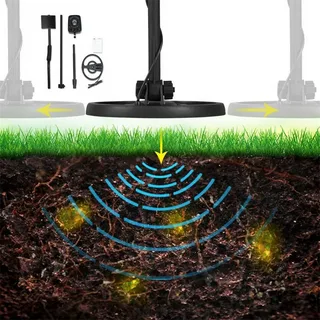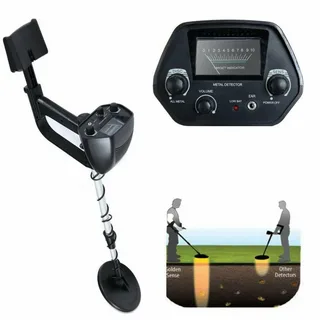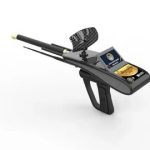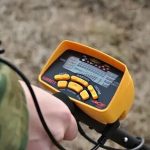Detektor metal: Have you ever wondered what lies beneath the ground, just waiting to be discovered? With the use of a metal detector, you have the opportunity to uncover hidden treasures that have been buried for years. Whether it’s ancient artifacts, lost jewelry, or valuable coins, the possibilities are endless. In this article, we will explore the exciting world of metal detecting and the thrill of discovering hidden treasures.
Metal detecting is a popular hobby that can lead to discovering hidden treasures buried underground. Using a metal detector, individuals can search beaches, parks, and other public areas for lost coins, jewelry, and other valuable items. Some enthusiasts also search for historical artifacts and relics. It can be an exciting and rewarding activity, but it’s important to be mindful of local laws and regulations regarding metal detecting to ensure a responsible and ethical approach to the hobby.
The History and Evolution of Metal Detectors

There are various types of metal detectors available on the market today, each designed for specific purposes such as security, recreational treasure hunting, or professional archaeological use. The detektor metal operates by sending out electromagnetic signals and detecting any disturbance in the magnetic field caused by metal objects. This allows users to pinpoint the location and depth of metal items buried underground or hidden from view. Whether you’re a novice or a seasoned detectorist, it’s important to understand the technology and techniques involved to make the most of your metal detecting experience.
The history of metal detectors dates back to the late 19th century, when scientists began developing the technology to detect metal objects buried underground. The first metal detector was invented by Alexander Graham Bell in 1881 as a means to locate a bullet in President James Garfield’s body.
The technology behind metal detectors continued to evolve over the years, with advancements in electronics and miniaturization leading to the development of portable and handheld metal detectors. These devices became widely used in the early 20th century for mining, industrial, and military purposes.
During World War II, metal detectors played a crucial role in detecting landmines and unexploded ordnance, saving countless lives. After the war, the technology was adapted for civilian use, and metal detectors became popular for treasure hunting, archaeological exploration, and security applications.
In recent years, metal detector technology has continued to advance, with improved sensitivity, discrimination capabilities, and user-friendly features. Modern metal detectors are used in a wide range of applications, from hobbyist treasure hunting to security screening at airports and public events. Overall, the history and evolution of metal detectors have demonstrated their enduring importance and versatility in a variety of settings.
How Metal Detectors Work: A Closer Look

Metal detectors work by utilizing the principles of electromagnetism to detect metal objects. When a metal detector is turned on, it produces an alternating current in a coil of wire. This current creates an electromagnetic field around the coil. When the coil is brought near a metal object, the magnetic field induces an electric current in the metal, which in turn creates its own magnetic field. This interaction between the metal detector’s electromagnetic field and the metal object’s magnetic field causes a change in the detector’s original electromagnetic field, which is then detected by the metal detector. This change is indicated to the user through an audible tone or visual display, alerting them to the presence of metal. Different metal detectors may employ various technologies and features, such as different frequencies, ground balancing, discrimination settings, and sensitivity adjustments, to improve their accuracy and performance in different environments and for different types of metal detection. Overall, the basic principle behind metal detectors remains the same, making them valuable tools for a wide range of applications, from security screening to treasure hunting.
Top 10 Uses for Metal Detectors

1. Finding lost jewelry and valuables: Metal detectors are commonly used to locate lost rings, bracelets, and other items made of metal.
2. Beachcombing: Many people use metal detectors to search for coins, jewelry, and other treasures on beaches and in shallow water.
3. Archaeological exploration: Metal detectors are a crucial tool for archaeologists to locate and excavate ancient artifacts and historical sites.
4. Security screening: Metal detectors are used in airports, public buildings, and events to screen for potentially dangerous metal objects.
5. Construction and utility work: Metal detectors help construction workers and utility workers locate buried metal pipes, cables, and other infrastructure.
6. Surveying and mapping: Metal detectors are used in geophysical surveys to map underground metal deposits and geological features.
7. Gold prospecting: Many hobbyists use metal detectors to search for gold nuggets, flakes, and veins in rivers, streams, and other natural settings.
8. Law enforcement: Metal detectors are used by law enforcement agencies to locate hidden weapons, evidence, and contraband.
9. Property maintenance: Property owners use metal detectors to locate buried property markers, septic tanks, and other buried objects on their land.
10. Hobby and recreational use: Metal detecting is a popular hobby for people of all ages, offering the thrill of discovery and the potential for finding valuable or historically significant items.
Choosing the Right Metal Detector for Your Needs

When choosing the right metal detector for your needs, consider factors such as the type of terrain you’ll be searching in, the types of metals you want to detect, and any specific features you may need. Different detectors are designed for different environments, such as beaches, parks, or rugged terrain. Additionally, some metal detectors are better suited for finding specific types of metals, such as gold or relics. Consider the level of experience you have with metal detecting as well, as some detectors are more advanced and may require more skill to use effectively. Researching and reading reviews can help you make an informed decision when choosing a metal detector.
Metal Detecting Tips and Tricks for Beginners
Metal detecting can be an exciting and rewarding hobby for beginners. Here are some tips and tricks to help get you started:
1. Research your local laws and obtain any necessary permissions before you start metal detecting in public areas such as parks or beaches.
2. Invest in a quality metal detector that suits your budget and needs. Consider factors such as depth range, discrimination capabilities, and waterproofness if you plan to use it in water.
3. Practice using your metal detector in different locations and soil conditions to become familiar with its functions and to improve your detecting skills.
4. Look for areas with high foot traffic or historical significance, as these are more likely to yield interesting finds.
5. Use headphones while detecting to better hear faint signals and to be considerate of others in public spaces.
6. Carry a digging tool and a finds pouch to help you retrieve and store your discoveries.
7. Learn how to properly identify and clean your finds to preserve their value and historical significance.
8. Join local metal detecting clubs or online communities to connect with experienced detectorists who can offer guidance and support.
By following these tips and tricks, beginner metal detectorists can increase their chances of making exciting discoveries while enjoying the great outdoors.
Uncovering Treasure: The Art of Metal Detecting
“Uncovering Treasure: The Art of Metal Detecting” is a comprehensive guide to the hobby of metal detecting. Written by experienced detectorist Steve Moore, the book covers everything from choosing the right equipment to understanding the history and science behind metal detecting. It also includes tips for finding and identifying different types of treasure, as well as insights into the ethical and legal considerations of digging up artifacts. Whether you’re a beginner or an experienced detectorist, “Uncovering Treasure” is a valuable resource for anyone interested in this popular pastime.
From Hobby to Profession: Making Money with Metal Detectors
From Hobby to Profession: Making Money with Metal Detectors is a comprehensive guide for individuals interested in turning their metal detecting hobby into a profitable profession. The book covers various topics such as identifying profitable locations, understanding different types of metal detectors and accessories, marketing and selling found items, and navigating legal and ethical considerations. The author provides practical insights and tips for maximizing earnings while enjoying the thrill of treasure hunting. Whether you’re a beginner or experienced metal detectorist, this book offers valuable information for monetizing your passion.
The Ethics of Metal Detecting: Respecting History and Property Rights
The Ethics of Metal Detecting: Respecting History and Property Rights suggests that metal detecting enthusiasts should be mindful of the historical and cultural significance of the areas they are exploring. It emphasizes the importance of obtaining permission from landowners before searching on private property, as well as following local laws and regulations regarding historical sites and artifacts. The article also discusses the potential impact of metal detecting on preserving history and the responsibility of practitioners to report any significant findings to local authorities. Overall, it promotes a respectful and responsible approach to metal detecting that considers the rights of property owners and the preservation of historical and cultural heritage.
Metal Detecting Laws and Regulations: What You Need to Know
Metal detecting laws and regulations vary from country to country and even within different states or regions. It is important to familiarize yourself with the specific laws and regulations in your area before engaging in metal detecting. Some common regulations may include obtaining permission from the landowner before detecting on private property, adhering to historical preservation laws by not disturbing or removing artifacts from protected sites, and respecting public land use restrictions. Additionally, it is important to be aware of any potential restrictions on the types of items that can be detected and the use of metal detectors in certain areas. Failure to comply with these laws and regulations can result in fines, confiscation of equipment, and legal consequences. It is also important to practice ethical metal detecting by filling in any holes created, properly disposing of any trash or debris found, and reporting any significant historical or valuable finds to the appropriate authorities.
Famous Finds: The Most Spectacular Discoveries by Metal Detectorists
Famous Finds: The Most Spectacular Discoveries by Metal Detectorists is a book that showcases some of the most remarkable discoveries made by metal detector enthusiasts around the world. The book features a wide range of artifacts and treasures, from ancient coins and jewelry to military relics and archaeological finds. It provides a fascinating insight into the world of metal detecting and the valuable contributions that hobbyists have made to our understanding of history. With stunning photographs and in-depth descriptions, it offers a captivating look at the incredible discoveries that have been made through the use of metal detectors.









